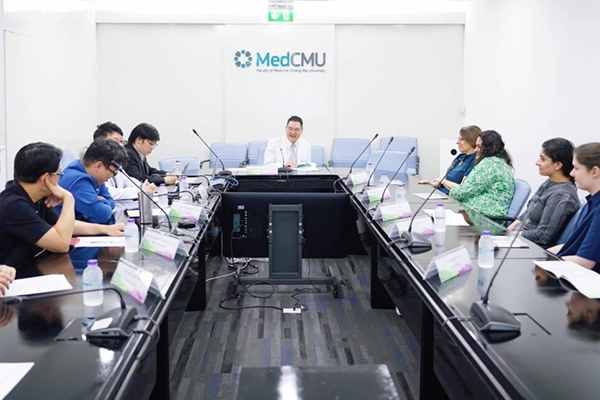
Trialling a Learning Health System in Thailand
We are co-leading an international team to test whether the Clinical Effectiveness approach to building a Learning Health System can prevent thousands of early deaths in Thailand.
14,000 deaths can be prevented over five years by controlling hypertension
The leading causes of death in Thailand are long-term conditions, including diabetes and chronic kidney disease, which are affected by lifestyle factors and high blood pressure. We are co-leading a team of collaborators alongside Chiang Mai University, the Ministry of Public Health in Thailand, and the London School of Hygiene & Tropical Medicine, to target these diseases specifically.
The programme uses patient record data to help Thai doctors identify patients who are at high risk of diabetes, kidney disease, or high blood pressure (hypertension), and inform their care. The approach has life-saving potential: Analysis by the World Health Organization estimates that reducing the number of people living with high blood pressure in Thailand will prevent an estimated 14,000 deaths, 27,000 strokes, and 18,000 heart attacks over five years.
Turning health record data into actionable insight
In Thailand, data from electronic health records are used by the Ministry of Public Health to understand how regions deliver care, but the insight is not available to frontline health workers in a format that is easy to use for improving population health. We are developing and implementing a similar Learning Health System to the one we’ve honed in North East London over the past 30 years; using software tools, patient record searches, templates, dashboards and facilitation to empower primary care doctors with better insight about their patients’ health.
The Learning Health System intervention will close the loop and make it possible to use routinely collected data for the benefit of patients.— Rohini Mathur, Programme Lead, Professor of Health Data Science at Queen Mary
The approach
We are designing and implementing the Learning Health System in three distinct phases, beginning with hypertension in 2024, followed by type 2 diabetes in 2025, and chronic kidney disease in 2026. For each disease area, the team are developing a software tool and dashboards that display data for cohorts of people. Supported by patient record searches, training and facilitation, the tools will allow doctors to easily identify high risk patients and work with them to manage controllable risk factors and prevent diseases from developing or getting worse. The team will trial and evaluate each phase of the intervention in 16 pilot practices.
Shaped by patients and professionals
Each phase begins with a series of workshops held in collaboration with the pilot practices. The sessions will involve Thai healthcare providers, researchers and patients, to identify challenges around improving care for people with hypertension, diabetes or kidney disease. We will involve ‘community champions’ (including professionals and members of the public) in every stage of designing, delivering and improving the Learning Health System.
Collaborating with international experts allows us to leverage global knowledge and tailor it to our local context. This partnership will not only enhance our capacity to address chronic diseases like hypertension and diabetes but also improve the overall health system in Thailand.— Chaisiri Angkurawaranon, Associate Professor and Head of the Global Health Research Centre at Chiang Mai University
Evaluation and long-term impact
One year into the intervention for each disease area, we will study the number of people whose health improved in comparison to a control group. We will also assess how expensive it was to deliver, and which components worked well, for whom, and in what circumstances. We plan to share the findings globally through collaborations with the Thai Ministry of Public Health and the World Health Organization.
If the Learning Health System approach is successful, it will be implemented widely across Thailand and potentially other countries in South East Asia. The programme team will train Thai PhD students, researchers and healthcare teams to lead the work going forward, creating a sustainable model that can continue to support life-saving care and improve population health.
Team
 Rohini Mathur, Chris Carvalho, John Ford, Milena Marszalek and Moneeza Siddiqui, in collaboration with Boby Mihaylova and colleagues from Chiang Mai University (led by Chaisiri Angkurawaranon), the London School of Hygiene & Tropical Medicine (led by Dorothea Nitsch), and the Ministry of Public Health in Thailand.
Rohini Mathur, Chris Carvalho, John Ford, Milena Marszalek and Moneeza Siddiqui, in collaboration with Boby Mihaylova and colleagues from Chiang Mai University (led by Chaisiri Angkurawaranon), the London School of Hygiene & Tropical Medicine (led by Dorothea Nitsch), and the Ministry of Public Health in Thailand.
Funding and support
Funded by the NIHR Global Health Research Groups programme (NIHR156161), using UK international development funding from the UK Government to support global health research. The programme has additional support from the British Council and Queen Mary University of London.


